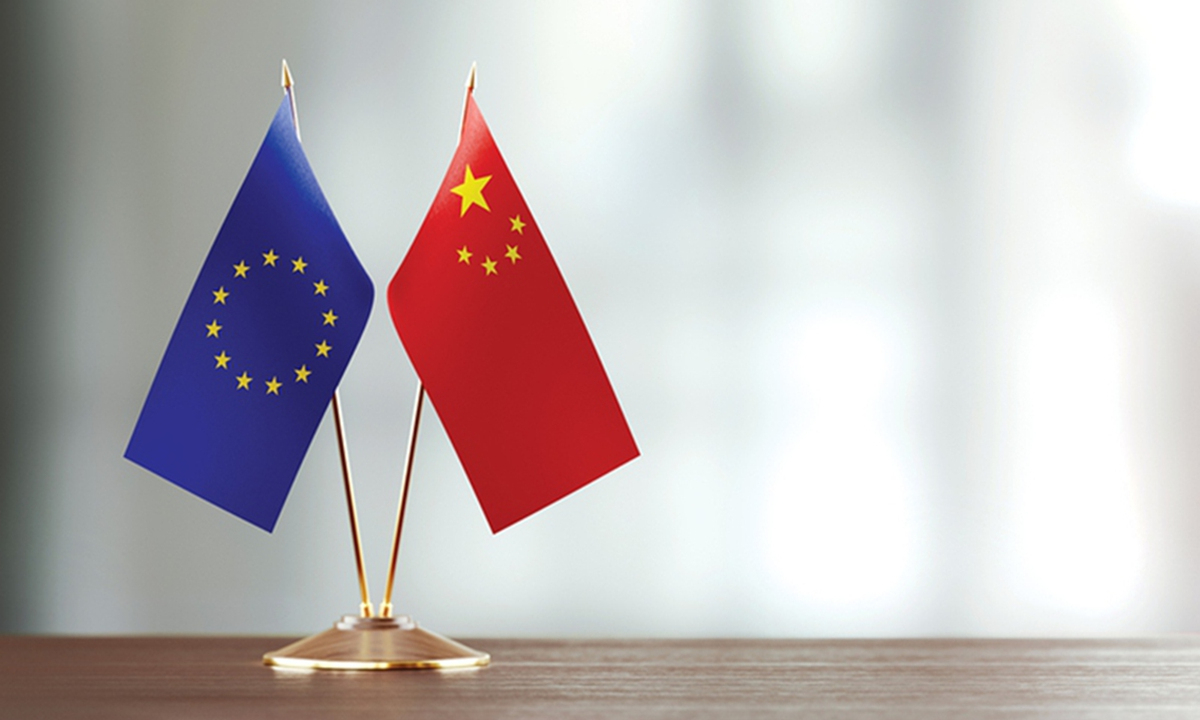
China EU Photo: VCG
China has always maintained the utmost sincerity and is committed to resolving the tariff dispute on Chinese electric vehicles (EVs) through dialogue and consultation, proposing flexible solutions, Lin Jian, spokesperson of China's Ministry of Foreign Affairs, said on Wednesday in response to a media question over Chinese Commerce Minister Wang Wentao's intensive meetings with officials of major EU member states over the EV tariff case.
The EU's probe on Chinese EVs is a typical protectionist and politically driven act that ignores objective facts, disregards WTO rules, goes against the trend of history, and undermines the EU's green transformation process and global efforts to address climate change, Lin further noted, urging the European side to show sincerity over the matter.
Chinese Commerce Minister Wang Wentao met with Wolfgang Schmidt, head of Germany's Federal Chancellery, in Berlin, on Tuesday, during which the two sides had in-depth discussions regarding issues such as the EU's anti-subsidy case against Chinese electric vehicles (EVs).
Wang stated that China has always shown utmost sincerity and is committed to resolving the anti-subsidy case through dialogue and consultation in line with the important consensus reached by Chinese and European leaders to avoid escalating trade tensions between China and the EU.
However, the EU has ignored China's efforts, insisted on imposing high anti-subsidy tariffs, and quickly and hastily rejected the comprehensive solution proposed by the Chinese industry, Wang told Schmidt, noting that China feels deeply disappointed, but will not give up its efforts and will insist on continuing consultations until the last moment.
Wang expressed hope that Germany, as a core EU member, would take the lead in playing a positive role to encourage the European Commission (EC) to show political will and work together with China to resolve the case appropriately.
The talks were conducted as part of the intensive meetings the Chinese commerce minister held with leaders of EU member states ahead of his upcoming meeting with European Commission Executive Vice President and Trade Commissioner Valdis Dombrovskis on Thursday.
Tariffs are not the solutionWang has been meeting with government officials from various countries including Germany and Italy in the past few days to express China's stance and concerns regarding the EC's EV tariff decision. This reflects the sincere desire from China to resolve differences through dialogue and to avoid escalating trade frictions, said Zhou Mi, a senior research fellow at the Chinese Academy of International Trade and Economic Cooperation.
China has close economic and trade ties with EU countries, and their interdependence and complementarity span various industries, including EVs. Zhou said that "for mutually beneficial economic cooperation, the bloc should respect the basic rules of the market and, especially, listen to the needs of the government officials as well as industry players including those within the region."
During talks with Wang, Schmidt emphasized that Germany strongly hopes for a resolution to the electric vehicle case through dialogue and consultation, believing that increasing tariffs is not the solution.
In a separate meeting on Tuesday, Robert Habeck, Vice Chancellor and Federal Minister for Economic Affairs and Climate Action of Germany, also told Wang that Germany supports free trade and welcomes investments from Chinese automotive and parts companies in Europe, opposing tariffs on Chinese EVs.
The EC said on September 12 that it had received offers from Chinese EV makers for minimum import prices into the EU market and had rejected all of them, according to Reuters.
"Despite some unsatisfactory feedback from the EU, the Chinese side will continue to negotiate with the EU with utmost sincerity and patience to resolve the issue. This also reflects the Chinese government's continued emphasis on economic and trade cooperation with Europe," Cui Hongjian, a professor at the Academy of Regional and Global Governance with Beijing Foreign Studies University, told the Global Times.
The upcoming talks with Dombrovskis present an opportunity for the EC to demonstrate its sincerity in resolving the issue with China and to avoid trade tensions, Cui said.
Meanwhile, the EC needs to consider this tariff case from a more comprehensive perspective, rather than limiting it to immediate interests or the concerns of a single country or the Commission itself, which views the imposition of EV tariffs as its so-called political legacy following the US' footstep, Cui added.




